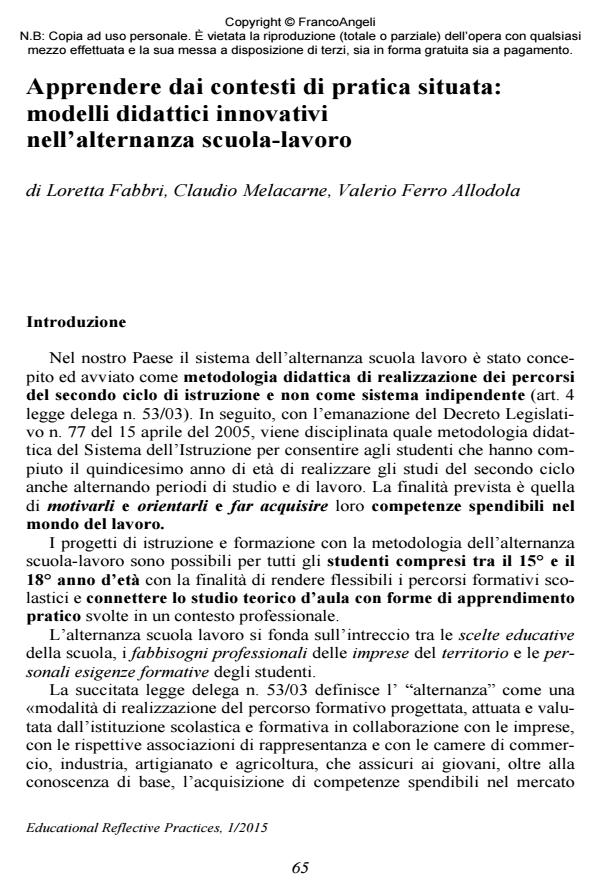Apprendere dai contesti di pratica situata: modelli didattici innovativi nell’alternanza scuola-lavoro
Titolo Rivista EDUCATIONAL REFLECTIVE PRACTICES
Autori/Curatori Loretta Fabbri, Claudio Melacarne, Valerio Ferro Allodola
Anno di pubblicazione 2015 Fascicolo 2015/1 Lingua Italiano
Numero pagine 13 P. 65-77 Dimensione file 114 KB
DOI 10.3280/ERP2015-001005
Il DOI è il codice a barre della proprietà intellettuale: per saperne di più
clicca qui
Qui sotto puoi vedere in anteprima la prima pagina di questo articolo.
Se questo articolo ti interessa, lo puoi acquistare (e scaricare in formato pdf) seguendo le facili indicazioni per acquistare il download credit. Acquista Download Credits per scaricare questo Articolo in formato PDF

FrancoAngeli è membro della Publishers International Linking Association, Inc (PILA)associazione indipendente e non profit per facilitare (attraverso i servizi tecnologici implementati da CrossRef.org) l’accesso degli studiosi ai contenuti digitali nelle pubblicazioni professionali e scientifiche
The projects of education and training with the methodology of "alternation between school and work" are possible for all students between 15° and 18° years of age, with the aim of making flexible the school training and connect the theoretical study of classroom with forms of learning activities in a professional context. It’s essential to connect a training alliance between teaching skills and the theme of the educational value of the work, as underlined by the guidelines issued to accompanying decrees, that set up the '"alternation". This, constantly, stress the importance that inside Curricula should take "the active teaching methods and the development of organic links with the world of work and the professions". So, that the workplace can be an important complement to the learning context of the classroom and the laboratory. Highlighting the importance of education and training of the work involves the fact that the school system no longer has a monopoly on the transmission of knowledge and co-exists with a variety of other educational agencies, especially businesses. We consider extremely important, in the light of these considerations, the formation of "teachers who organize activities in the "alternation" between school and work". The formation of this teaching specialist aims to outline a figure highly competent, in total support of the Headmaster and, possibly, as his collaborator chosen, as required by the text of the "Good School" in Italy.;
- Associazione Nazionale Presidi (ANP), La Buona Scuola – Scheda di lettura analitica.
- Castellano A., kastorinis X., Lancellotti L., Marracino R., Villani L. A. (2014). Studio ergo Lavoro. Come facilitare la transizione scuola-lavoro per ridurre in modo strutturale la disoccupazione giovanile in Italia, McKinsey&Company.
- Fabbri, L. (2007). Comunità di pratiche e apprendimento. Per una formazione situata. Roma: Carocci.
- Fabbri, L., Melacarne, C. (2015). Apprendere a scuola. Metodologie attive di sviluppo e dispositivi riflessivi. Milano: FrancoAngeli.
- Melacarne C. (2011). Apprendimento e formazione nella vita quotidiana. Sull’identità del professionista dell’educazione. Napoli: Liguori.
- Nicoli, D. (2011). Istruzione e formazione tecnica e professionale in Italia. Il valore educativo e culturale del lavoro. Roma: LAS.
- Employability & Competences Concetta Tino, pp.151 (ISBN:978-88-6453-671-2)
- Service Learning and LifeComp framework: analysis of experiences in distance education Patrizia Lotti, Lorenza Orlandini, in Research on Education and Media /2022 pp.46
DOI: 10.2478/rem-2022-0006
Loretta Fabbri, Claudio Melacarne, Valerio Ferro Allodola, Apprendere dai contesti di pratica situata: modelli didattici innovativi nell’alternanza scuola-lavoro in "EDUCATIONAL REFLECTIVE PRACTICES" 1/2015, pp 65-77, DOI: 10.3280/ERP2015-001005